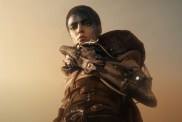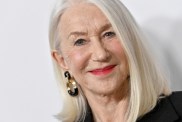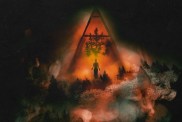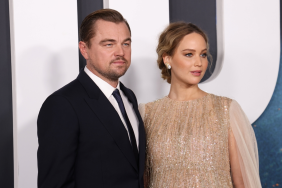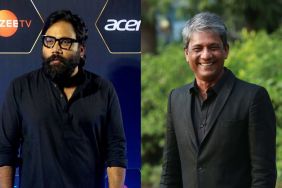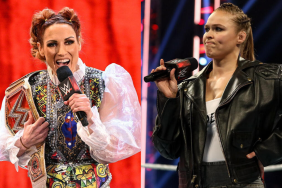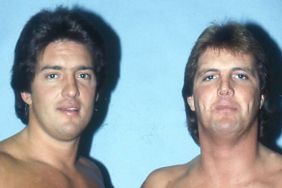The last time ComingSoon.net spoke to director Martin Campbell, it was during the press tour for his Bond reboot Casino Royale, and it’s hard to believe that was over three years ago. Campbell is back with the suspense thriller Edge of Darkness, a movie adapted from the six-hour BBC mini-series of the same name Campbell directed back in 1985.
It also marks the return of Mel Gibson, actor, back and better than ever in a role that’s perfectly suited to his skills as a leading man that have laid dormant since 2002’s Signs. In the movie, Gibson plays Thomas Craven, a Boston police detective looking to get answers and possible revenge against those responsible for the brutal murder of his daughter, and getting in over his head when he encounters Darius Jedburgh, played by Ray Winstone, an enigmatic man who has been assigned to clean up any loose ends in the government conspiracy of which Craven is their top priority.
While on the surface, Edge of Darkness is a revenge thriller, it eventually evolves into something more like last year’s State of Play and The International, mixing action with suspense to create another tight government conspiracy thriller.
ComingSoon.net got on the phone with Campbell a couple weeks back to talk about his new movie as well his next project, the first feature film based on DC Comics superhero Green Lantern, which goes into production very soon.
ComingSoon.net: When I saw the movie, I knew nothing about it and only learned from the press notes that it was based on a television show that you directed 25 years ago. It’s kind of interesting you decided to revisit the material so how did that come about?
Martin Campbell: What happened was that someone suggested making it into a movie way back in 2000, and I was kind of lukewarm about it. I thought, “Oh, well… maybe they can get some money to develop the thing,” and over the next five or six years, a writer called Andrew Bovell, a very good writer from Australia, sort of whittled it down from six hours to where it is now, a two-hour movie. I was doing other projects, “Casino” amongst them, and this was being developed as it were behind me, and then at about the sixth draft, it was shaping up pretty well, and I read it, and I had just met Graham King and had suggested it to him, and he said, “Look, I’ll finance it, because I love the series,” so he did. I sent it to Mel, and Mel was kind of interested. We then got Bill Monahan to do the final two drafts of the movie, and Mel was on board, so it all came together basically.
CS: Was the movie going to be called something else at one point?
Campbell: Always “Edge of Darkness.”
CS: It was? Okay. So you were actually involved with this from the inception of the idea, but were you just sitting back to see how the screenplay turned out before committing to direct?
Campbell: Yeah, you know, there were other projects. I was waiting to see. You always have five or six projects in development, and I just waited to see how the script turned out, and just all those elements came together, both the finance and Mel Gibson, so it seemed appropriate to do it.

CS: Did you actually go back and watch the original show at any time during this process or did you try to approach it as a completely different thing?
Campbell: I treated this as a completely separate film.
CS: Did you have any memories of making the show?
Campbell: Oh, God yes. I remember it vividly, but I did take the attitude that this was an entirely different project, and that the only way to deal with it really was to start fresh, as though I never done the series.
CS: Did you feel that you’ve grown a lot as a director where you could bring something completely different to the material?
Campbell: Oh, well, yeah. First of all, I never envisioned myself making feature films, and those days at the BBC, of course television was such a different thing. In fact, I hope I shot the film fairly simply. I didn’t try to do anything pretentious with the way it was shot. I didn’t try to make any great statement except shoot it straightforwardly, realistically, and try to give it kind of a gritty feel to keep it in reality, as opposed to what I might do with a Bond film, which is obviously slicker and a glossier kind of take. Do you know what I mean?
CS: Is there anything you’ve brought from your television days to directing features? I know you work very fast because I saw that when I was on the Bond set, as you got a lot of set-ups done in a couple hours.
Campbell: Well, of course, you learn and the point about TV is that’s where you learn all the basics of your craft. Nowadays, TV unfortunately just seems to be endless close-ups. There’s no style to it really other than handheld being a euphemism for style, but of course, you sort of develop when you get into feature films, because stylistically, you hope you can actually do something a little different for each film.
CS: I’ve never seen the original TV show, so how has the story changed, since times are very different now than in the ’80s and national security is a major issue. You brought some of that into the story, but I wasn’t sure how much there originally and it just happened to work still.
Campbell: I’ll tell you what. Clearly you have to lose a lot of stuff when you reduce six hours down. The political backdrop is very different. It was set in Thatcher’s England, if you see what I mean, and it had a lot to say about that. Also, a lot of characters went naturally. The characters that remain are the leads which is Jedburgh and Craven, and all the emotional stakes in the movie are identical to the series i.e. a police detective whose daughter is murdered and he sets out to discover who was responsible. The kind of emotional spine of the story is identical to the series.
CS: What was involved with getting Mel interested in it? He obviously hasn’t been acting in a long time, being behind the camera instead, so did it take a lot to talk him into doing it?
Campbell: No, no. What happened was that he had seen the series, which got his interest up. He read the last of the Bovell drafts. He then was interested but we just needed to push it over the line. Once Monahan had written his draft then Mel was absolutely on board.

CS: How closely did you work with Mel on creating the character and deciding upon the right accent. I imagine Bill must have a really good take on Boston after writing “The Departed.”
Campbell: The point is that Monahan is from Boston so clearly he can write about it and those character, the sort of Boston Irish thing, he knows all of that, and Mel is very intuitive. He has a great ability with the accent for example, he did have someone who was there, a dialect coach, as it were–that was for everybody–but Mel occasionally asked him one or two things but Mel instinctively picks it up. He has a very good ear for accents.
CS: How is Mel as a collaborator? He’s obviously a great filmmaker in his own right. Can he turn all that off and just focus on being an actor?
Campbell: He simply said at the beginning of the movie. He obviously anticipated that very point so he came to me and said, “Look, I’m just an actor. I’m not a director, I’m not a producer, I’m none of that. I simply want to act in this and that’s what we’re doing.” He made it very clear up front that that’s what his role was.
CS: What would you like people to get out of the movie now that more people will get to see it? These days, there’s just naturally more distrust of the government and corporations…
Campbell: That doesn’t really interest me that much. There’s no message here, really. It’s simply the emotional arc of Craven. He is someone who loses the only person in the world he loves, his daughter, goes on a journey to find out who did it, and finds out all of this stuff she’d been involved with. He had no clue what his daughter was up to. I think it’s his journey, the emotional spine of the story which I’m interested in, and I hope people will respond to that. The political story is I suppose interesting. Obviously, it’s a conspiracy story. Yes, the American government military do indeed subcontract to private corporations, that happens all the time, so a lot of it is ostensibly true even though the actual goings on are all a work of fiction, but that’s not really trying to make any statement. That’s just part of the rather dark world that she was caught up in.
CS: I’d like to ask a couple questions about your next project “Green Lantern” if I may. I know you’re a director who tends to do stuff for real and on-camera as much as possible, and this will probably be a very heavy CG FX-related project. Was that one of the reasons you were interested in doing it?
Campbell: First of all, I’d never done a superhero movie before. Second of all, he’s quite fascinating as a character, given that his powers are psychological, it’s to do with will power as you probably know, and his enemy is fear. All that’s interesting and he’s the only superhero to go to another planet, which is very unusual. The combination of that… the main thing I’ve got to do is keep a sense of reality about it, and we endlessly at meetings have what we call a ‘Cheese-Meter’ (chuckles) which whenever we have ideas or how we’re going to do something or develop it, we all talk about the cheese factor, about keeping it in reality and not letting it get too cheesy. I’m very aware of all of that, and I hope I will bring a sense of reality to it so it doesn’t get in the realm of “comic book” as such.
CS: I think people are generally excited for it after seeing what you did with Bond in “Casino Royale” after doing “GoldenEye.” Are there any specific comics that people can read to prepare for the movie?
Campbell: Actually, it’s the origin story really. You may or may not know but there are five human Green Lanterns over the period of some 60 years, since 1940, which is when they first wrote it, and ours is Hal Jordan, who happens to be the most popular Green Lantern. He’s the fighter pilot from Ferris Aviation so that origin story is fairly clearly in the comics, and it’s fairly well known so we’re sticking in principle fairly closely to that.

CS: I know it’s very early and you haven’t started shooting yet, but do you see yourself doing more than one of these? I think people were surprised to see you coming back to Bond and even with Zorro you did a sequel, so do you see yourself doing multiple movies?
Campbell: Yeah, I’d like to. You get a little protective about the franchise sometimes, you sort of say, “I’ve done it once so I’ll do it again” and in the case of Bond, it was great to have an opportunity to do the first book that (Ian Fleming) ever wrote and indeed the last book that’s been filmed. Because he didn’t actually write that many books, so that was an opportunity, and again, it’s an origin story of Bond. It was the first time outing for Fleming when he wrote that, so that was interesting and it was worth going back for. I certainly wouldn’t have gone back and done just another Bond film, because there was no point, having done “GoldenEye.” He could only blow up so many control rooms (chuckles)… I wouldn’t have done that. I’m just interested in the origin story of “Green Lantern” because I think he’s just more complex and with more hang-ups as those superheroes and probably a lot of the others.
CS: I don’t know if you can answer this, but are they hoping you can set-up anything for a future “Justice League” movie or is it more about telling Hal Jordan’s story? Are you expected to include any tidbits towards future movies?;
Campbell: No, I think it will stick closely to the origin story, but of course, we all know that Sinestro for example is a character who goes over to the Dark Side, and of course, we have Carol. She’ll be played by Blake Lively. I think people will be able to see forward in the characters, that in the comic went on to become… in Sinestro’s case, he goes over to the Dark Side and indeed Carol in later versions becomes a bad guy as well. (laughs) But people will be ahead of us on all that I think.
CS: Definitely the people who know the comics. I don’t think Green Lantern’s origin or history is that well known outside of them, similar to “Iron Man” in that sense. I don’t think the comics were as read as something like “Superman” or “Spider-Man.”
Campbell: Well, believe it or not, it is at the moment the most-read comic.
CS: Oh, of course nowadays it is and that’s a pretty amazing turnaround for the character.
Campbell: “Blackest Night” is apparently very popular so these things bubble under the surface, it’s quite interesting.
Edge of Darkness opens nationwide on Friday, January 29.
